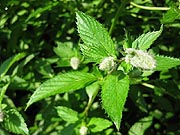Health Benefits of Peppermint

Peppermint (Mentha piperita), a popular flavoring for gum, toothpaste, and tea, is also used to soothe an upset stomach or to aid in digestion. Because it has a calming and numbing effect, it has been used to treat headaches, skin irritations, anxiety associated with depression, nausea, diarrhea, menstrual cramps, and flatulence. It is also an ingredient in chest rubs, used to treat symptoms of the common cold. In test tubes, peppermint kills some types of bacteria and viruses, suggesting it may have antibacterial and antiviral properties.
The natural compounds in peppermint (menthol, manganese and vitamins C and A) help soothe your system, stimulate helpful digestive enzymes, and block the growth of bad bacteria. To prevent indigestion, drink a cup of peppermint tea before or after meals. To ease cramping, constipation or diarrhea, try capsules of whole-leaf peppermint oil extract.
A number of studies have shown that enteric-coated peppermint capsules can help treat symptoms of irritable bowel syndrome (IBS), such as pain, bloating, gas, and diarrhea. Enteric-coated capsules keep peppermint oil from being released in the stomach, which can cause heartburn and indigestion. However, a few studies have shown no effect. One study examined 57 people with IBS who received either enteric-coated peppermint capsules or placebo twice a day for 4 weeks. Of the people who took peppermint, 75% had a significant reduction of IBS symptoms. Another study comparing enteric-coated peppermint oil capsules to placebo in children with IBS found that after 2 weeks, 75% of those treated had reduced symptoms.
When taken orally as tea or tablets, peppermint is also used for relieving respiratory conditions such as colds, coughing, acute respiratory difficulties, and for bacteria, fungal, and viral infections. It may be inhaled as oil for soothing irritated nasal passages from allergies and can be rubbed on the chest for comfort and relief of other respiratory discomfort.
When applied topically, peppermint oil can relieve headache. Researchers at Christian-Albrecht University in Germany found that peppermint oil, applied to the forehead, has the same pain-relieving effect as 1,000 milligrams of acetaminophen, or two 500-milligram Tylenol tablets. In most subjects, regardless of age or sex or the duration of the headache, peppermint was just as effective at relieving pain as acetaminophen. Applying peppermint oil to the temples can also relax muscles and decrease tension.
Cautions:
Do not give peppermint to an infant or small child. Peppermint oil applied to the face of infants can cause life-threatening breathing problems. In addition, peppermint tea may cause a burning sensation in the mouth. For digestion and upset stomach in older children: 1 — 2 mL peppermint glycerite per day.
Do not take peppermint or drink peppermint tea if you have gastroesophageal reflux disease (GERD — a condition where stomach acids back up into the esophagus) or hiatal hernia. Peppermint can relax the sphincter between the stomach and esophagus, allowing stomach acids to flow back into the esophagus. By relaxing the sphincter, peppermint may actually make the symptoms of heartburn and indigestion worse.
|